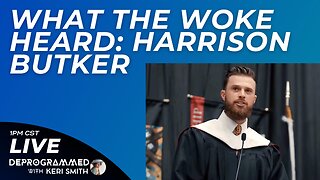Globalist American Empire versus "We the People": Unraveling the Origins of Fear and Uncertainty
In this thought-provoking video, we delve into the contrasting dynamics between the globalist American empire and the ideals represented by "We the People," seeking to understand the underlying reasons why people feel fearful in this context. Join us as we navigate the complexities of this dichotomy and explore the origins of fear and uncertainty in society.
Through insightful analysis and expert commentary, we examine the historical, political, and economic factors that contribute to people's fears within the globalist American empire framework. We delve into the perceived erosion of national identity, concerns about loss of autonomy, and anxieties surrounding cultural and economic homogenization.
Our knowledgeable speakers shed light on the social and psychological implications of these fears, addressing topics such as inequality, loss of community, and the perceived impact on individual rights and freedoms. We also explore the role of media narratives and political rhetoric in shaping public perceptions and amplifying anxieties.
By providing a balanced and comprehensive perspective, we aim to foster understanding and empathy, encouraging viewers to critically evaluate the sources of their own fears and uncertainties. We invite open dialogue and invite viewers to consider alternative narratives and perspectives that can contribute to a more nuanced understanding of these complex issues.
Whether you're an engaged citizen, a student of political science, or someone seeking to explore the underlying factors behind societal fears, this video offers valuable insights into the globalist American empire versus "We the People" dichotomy. Join us as we delve into the origins of fear and uncertainty, and strive to foster constructive conversations that promote understanding and cooperation.
Watch now to gain a deeper understanding of why people feel fearful in the context of the globalist American empire versus "We the People" narrative.
-
 50:03
50:03
The Jeremy Ryan Slate Show
1 month ago $0.27 earnedExposed: The Toxic Truth Behind Modern Medicine
2321 -
 LIVE
LIVE
Kimberly Guilfoyle
2 hours agoNOTHING TO BRAGG ABOUT: Sham NY Case Implodes, Live with Jeffrey Clark & Larry Elder | Ep. 127
715 watching -
 LIVE
LIVE
Redacted News
1 hour agoBREAKING! Iran Helicopter Mystery Deepens, Global Terror Alert Issued by U.S. | Redacted News Live
9,583 watching -
 DVR
DVR
In The Litter Box w/ Jewels & Catturd
17 hours agoERECTIONISTS! | In the Litter Box w/ Jewels & Catturd - Ep. 571 - 5/20/2024
14.7K14 -
 LIVE
LIVE
Crain and Company
1 hour agoEA College Football Trailer Drops + Trey Wingo Talks PGA Championship and Scottie Scheffler
783 watching -
 LIVE
LIVE
Deprogrammed with Keri Smith
2 hours agoWhat the Woke Heard: Harrison Butker's Speech - LIVE Deprogrammed with Keri Smith
1,343 watching -
 17:29
17:29
Breaking Points
6 hours agoBREAKING: Iran President DEAD In Helicopter Crash, What's Next?
63.4K116 -
 57:54
57:54
Ben Shapiro
3 hours agoEp. 1968 - IRANIAN PRESIDENT DEAD IN HELICOPTER CRASH
41.2K44 -
 2:40:45
2:40:45
Russell Brand
6 hours agoBREAKING: IRAN PRESIDENT DEAD! Murder or accident? - Stay Free #369
154K341 -
 LIVE
LIVE
Tommy's Podcast
1 hour agoE458: CraigTV
579 watching